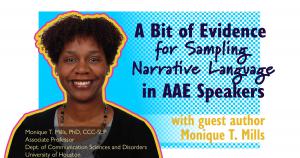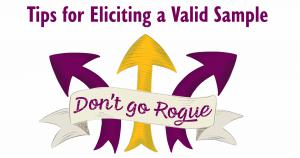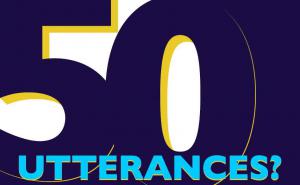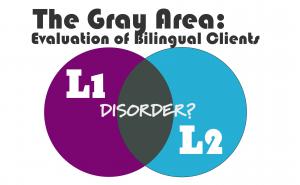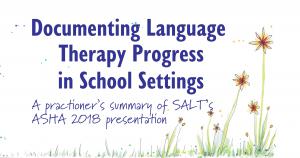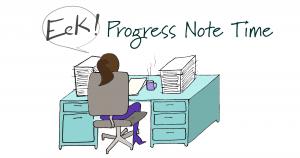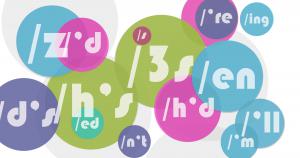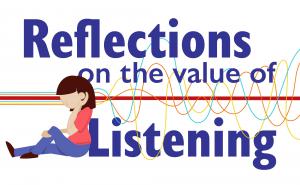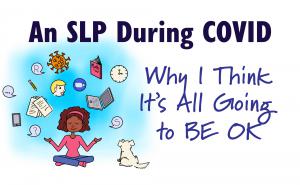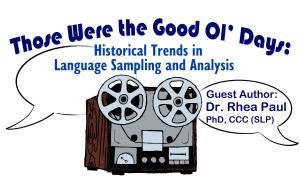-
A Bit of Evidence for Sampling Narrative Language in AAE Speakers
Feb 02 20210Dear Clinical Colleagues, I hope this finds you relatively safe and sane. Language sample analysis may be a challenge to your limited time and resources. Don’t you wish you COULD fit language sampling into your busy schedule? After all, language sampling is part of the “gold standard” for assessing language in monolingual and bilingual children. After you collect a language sample, you ca...
-
It Makes a Difference: Tips for Eliciting a Valid Sample That Doesn’t Go Rogue!
Jan 29 2021Dressed in my “clinic outfit” in the modest room with the oversized two-way mirror, I’m ready to record. I have been instructed to elicit a conversational language sample from my client. My supervisor is behind that mirror. How hard can it be to get this child to talk with me? What I thought would be the easiest part of the session turned out to be a lot harder than I expected. What was s...
-
Fifty Utterances? The Why’s and How’s of Language Sample Length
Jan 28 2021When you learned about language sample analysis in grad school, you probably heard that sample length may vary but that you should aim for about fifty utterances. In the “olden days” we were shooting for 15 minutes or 100 utterances; whichever came first. I’ll gloat: our own research was key in establishing the 50 complete, intelligible, and verbal utterance guideline. So, where does that numbe...
-
The Gray Area: Evaluation of Bilingual Clients
Jan 28 2021As SLPs we are responsible for assessing all learners who may potentially have a language disorder and of course this includes students with culturally and linguistically diverse backgrounds. In my own clinical practice as school-based SLP, I have to admit that when I hear about an upcoming evaluation of a bilingual student, I get a nervous. It’s overwhelming and a huge responsibility. We need ...
-
Documenting Language Therapy Progress in School Settings
Jan 28 2021Last November at ASHA we decided to focus our efforts on documenting progress in our talk, “Documenting Language Therapy Progress in School Settings.” It was exciting (and a bit nerve wracking) to present to a packed room, but we were so grateful for everyone who attended! Judging by the number of SLPs who showed up, it’s fair to say that the demand to demonstrate accountability as a school-bas...
-
Eek! Progress Note Time
Jan 28 2021We just wrapped up the second trimester at school and I finished writing out progress notes for nearly 60 kids on caseload, all of whom have multiple goals on which to report. Every trimester I’m a little daunted by the fact that I have to write progress notes on top of managing therapy sessions, evals and IEPs - it’s another thing to get done. I need to be pretty focused if I’m going to ever g...
-
Why do we mark some bound morphemes and not others?
Jan 28 2021The SALT reference databases use a very specific set of conventions for marking bound morphemes. Our protocols do not represent the only way to mark morphemes but if you want to compare your sample against our databases, it is important for you to use these same conventions. If you aren’t interested in the nuts and bolts, just skip down to the “Summary” section. It’s the most condensed version ...
-
Reflections on the Value of Listening
Jan 28 2021How SALT Evolved Since the first version of SALT software in 1981, before we even had a name for it, our focus was on how to coax a computer to carry out as much of the labor of language sample analysis (LSA) as possible. The idea was to reduce the encumbrance of some of the steps, leaving clinicians with more time for interpreting the results. Over the years, SALT has worked to improve the con...
-
An SLP in the Age of COVID: Why I Think It’s All Going to Be OK
Jan 28 2021This has been a challenging fall to say the least. We have all been thrown into remote learning or a hybrid version of school. Tensions are high among parents wanting their kids back in school and teachers wanting to be back in school as well. But no one wants to contract COVID. Most of us are still figuring out what all of this means for our day-to-day practice. As I reflect on the first month...
-
Those were the Good Ol’ Days: Historical Trends in Language Sampling and Analysis
Jan 27 2021Rhea Paul, PhD, CCC-SLP Sacred Heart University Rhea received her Ph.D. from the University of Wisconsin-Madison in 1981, and has taught language development and disorders in children for over 30 years. You probably know her as the author of the quintessential textbook: Language Disorders from Infancy Through Adolescence. Her latest projects include her podcast, Let’s Talk About Super Special K...

